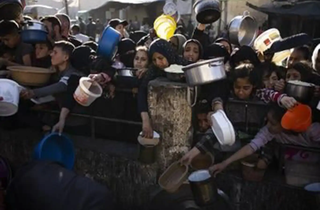The assessment, which has been conducted by the global IPC food security initiative, highlights the severe impact on livelihoods and food availability in the besieged enclave.
According to the report, 133,000 people—approximately 6 percent of Gaza’s population—are already experiencing Phase 5, or "catastrophic" food insecurity. This number is expected to rise dramatically, with estimates suggesting that up to 345,000 people (16 percent of the population) could face similar conditions between November and April next year.
The assessment warns that the risk of famine is present across the entire Gaza Strip, especially amid the continued hostilities. The report highlights growing concerns that the worst-case scenario may become a reality as food systems collapse.
During regular briefing at the UN headquarters in New York on Thursday, Deputy Spokesperson Farhan Haq expressed the alarm of UN Secretary-General António Guterres at the findings. "One year into the conflict, famine looms. This is intolerable," Mr. Haq stated.
He also urged Israel to immediately reopen all crossing points to allow humanitarian aid to flow into Gaza. "Bureaucratic impediments must be removed, and law and order restored in Gaza so that UN agencies can deliver lifesaving humanitarian assistance," Haq emphasized.
The IPC assessment calls for an urgent and unconditional ceasefire, restoration of food systems, and improvements in the management of rising malnutrition in Gaza. It stresses the need for widespread access to food, medical supplies, water, and essential services across the region to prevent further descent into famine.
The report also recommends bolstering supplementary feeding programs for infants and young children, as well as promoting breastfeeding and providing care for non-breastfed infants as part of a broader effort to tackle acute malnutrition. (ILKHA)



 Güncel
Güncel
 Spor
Spor
 Güncel
Güncel
 Güncel
Güncel
 Güncel
Güncel
 Güncel
Güncel
 Dünya
Dünya
 Ekonomi
Ekonomi
 Dünya
Dünya
 Güncel
Güncel





